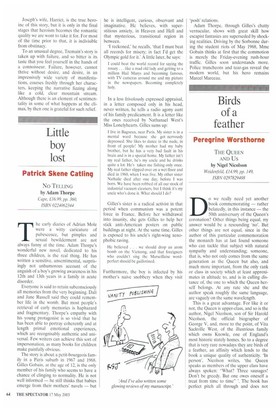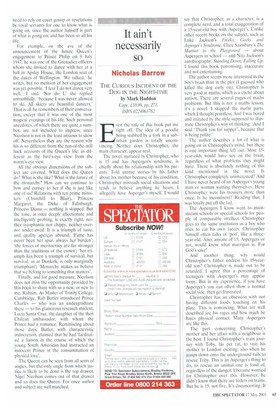Birds of a feather
Peregrine Worsthorne
THE QUEEN AND US by Nigel Nicolson Weidenfeld, £14.99, pp. 149, ISBN 0297829408 Do we really need yet another book commemorating — rather belatedly, in this instance — the 50th anniversary of the Queen's coronation? Other things being equal, my answer would be a resounding 'no'. But other things are not equal, since in the author of this particular commemoration the monarch has at last found someone who can tackle that subject with natural sympathy and understanding; someone, that is, who not only comes from the same generation as the Queen but also, and much more important, from the only rank or class in society which at least approximates in altitude to, and is in calling distance of, the one to which the Queen herself belongs. At any rate she and the author speak roughly the same language, are vaguely on the same wavelength.
This is a great advantage. For like it or not, the Queen is upper-class, and so is the author, Nigel Nicolson, son of Sir Harold Nicolson, the official biographer of George V, and, more to the point, of Vita Sackville West, of the illustrious family which owns Knowle, one of England's most historic stately homes. So to a degree that is very rare nowadays they are birds of a feather, an affinity which lends to the book a unique quality of authenticity. 'In person', Nicolson writes, 'the Queen speaks as members of the upper class have always spoken: "What? Three sausages! Don't be greedy. But one owes oneself a treat from time to time" '. The book has perfect pitch all through and does not
need to rely on court gossip or revelations by royal servants for one to know what is going on, since the author himself is part of what is going on. and has been so all his life.
For example, on the eve of the announcement of the future Queen's engagement to Prince Philip on 8 July 1947, he was one of the Grenadier officers whom she invited to dance with her at a ball in Ansley House, the London seat of the dukes of Wellington. We talked,' he writes, but no mention of her engagement was yet possible. 'I fear I do not dance very well,' I said. 'Nor do I,' she replied untruthfully. 'because I was never allowed to ski. All skiers are beautiful dancers.' That is all he remembers of their conversation, except that it was one of the most magical evenings of his life. Such personal anecdotes, of which there are quite a number, are not included to impress, since Nicolson is not in the least anxious to show off. Nevertheless they are the reason why his is so different from the run-of-the-mill hack accounts of the Queen's life: as different as the bird's-eye view from the worm's-eye view.
All the obvious dimensions of the subject are covered. What does the Queen do? What is she like? What is the future of the monarchy? How can we continue to bow and curtsey to her if she is just like one of us? Relations with ten prime ministers (Churchill to Blair), Princess Margaret, the Duke of Edinburgh, Princess Diana — nothing is skipped. But the tone, at once deeply affectionate and intelligently probing, is exactly right, neither sycophantic nor chippy, neither overnor under-awed. It is a triumph of taste. and quality apercus abound. 'Fame has never been her spur, always her burden': 'the forces of meritocracy are far stronger than the traditions of the crown': 'her triumph has been a triumph of survival, but survival, as at Dunkirk, is only marginally triumphant': 'Monarchy makes us believe that we belong to something that matters'.
Finally, and for good measure, Nicolson does not miss the opportunity provided by this book to share with us a new, or new to me, Rabism. As Master of Trinity College, Cambridge, Rab Butler introduced Prince Charles — who was an undergraduate there — to his glamorous research student, Lucia Santa Cruz, the daughter of the then Chilean ambassador, with whom the Prince had a romance. Reminiscing about those days, Butler, with characteristic indiscretion, claimed that he had 'facilitated a liaison in the course of which the young South American had instructed an innocent Prince in the consummation of physical love'.
The Queen can be seen from all sorts of angles, but the only angle from which justice is likely to be done is the top drawer. Nigel Nicolson comes out of that drawer and so does the Queen. For once author and subject are well matched.



































































































 Previous page
Previous page